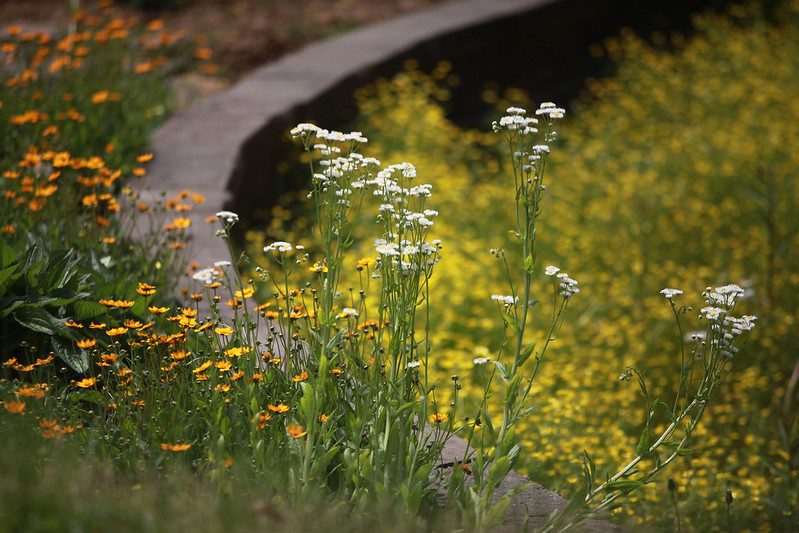May 7, 2021
Upcoming webinar: Benefits of rain gardens extend beyond the back yard
By Tracy Courage
U of A System Division of Agriculture
Fast facts:
- Rain gardens reduce stormwater runoff, beautify landscapes, provide pollinator habitat
- May 18 webinar teaches what to plant, where to plant, how to build
(306 words)
(Newsrooms: with additional art available at https://bit.ly/3h9drgd)
LITTLE ROCK — Many homeowners and backyard gardeners are finding that do-it-yourself
rain gardens are the perfect addition to their yards because they are not only attractive
but also good for the environment.
“They are an all-star landscape feature that can not only beautify a landscape but
also improve water quality and water conservation,” John Pennington, extension water
quality instructor for the University of Arkansas System Division of Agriculture,
said. “Rain gardens capture runoff and allow it to filter into the ground, reducing
stormwater runoff that often causes flooding and pollutes streams and lakes.”
Pennington will host a free webinar on rain gardening on May 18, from 1:30-2:30 p.m. (CST). Participation is free, but registration is required.
Learn more about rain gardens at https://uaex.uada.edu/raingarden.
The webinar is designed for homeowners, gardeners, community volunteers and anyone
interested in rain gardens. Pennington will explain the particulars of rain garden
how-to’s. Berni Kurz, extension horticulture specialist for the Division of Agriculture,
will discuss plants that are best suited for rain gardens and considerations for placement.
Native plants, grasses and shrubs all provide food and shelter for birds, butterflies
and other beneficial wildlife.
How they work
Rain gardens are bowl-shaped landscaped depressions that collect runoff from a roof,
paved area or yard. The design of the landscape feature reduces and filters stormwater
runoff.
The rain garden’s flat bottom distributes rainwater evenly across the planted area. Topsoil, mixed with compost and sand, allows the water to slowly soak into the ground within a few days so water is not standing and breeding mosquitoes.
For detailed information about how to build a rain garden and a list of suitable native plants, download Extension’s fact sheet FSA9533 — “Rain Gardens and Stormwater” — at https://bit.ly/3f4xRUW.
The webinar is part of an Expanding Green Infrastructure grant funded by the Arkansas Division of Natural Resources and the U.S. Environmental Protection Agency.
To learn about extension programs in Arkansas, contact your local Cooperative Extension Service agent or visit www.uaex.uada.edu. Follow us on Twitter at @AR_Extension.
About the Division of Agriculture
The University of Arkansas System Division of Agriculture’s mission is to strengthen agriculture, communities, and families by connecting trusted research to the adoption of best practices. Through the Agricultural Experiment Station and the Cooperative Extension Service, the Division of Agriculture conducts research and extension work within the nation’s historic land grant education system.
The Division of Agriculture is one of 20 entities within the University of Arkansas System. It has offices in all 75 counties in Arkansas and faculty on five system campuses.
Pursuant to 7 CFR § 15.3, the University of Arkansas System Division of Agriculture offers all its Extension and Research programs and services (including employment) without regard to race, color, sex, national origin, religion, age, disability, marital or veteran status, genetic information, sexual preference, pregnancy or any other legally protected status, and is an equal opportunity institution.
# # #
Media contact:
Tracy Courage
Director, Communications Services
U of A System Division of Agriculture
Cooperative Extension Service
(501) 671-2126
tcourage@uada.edu
